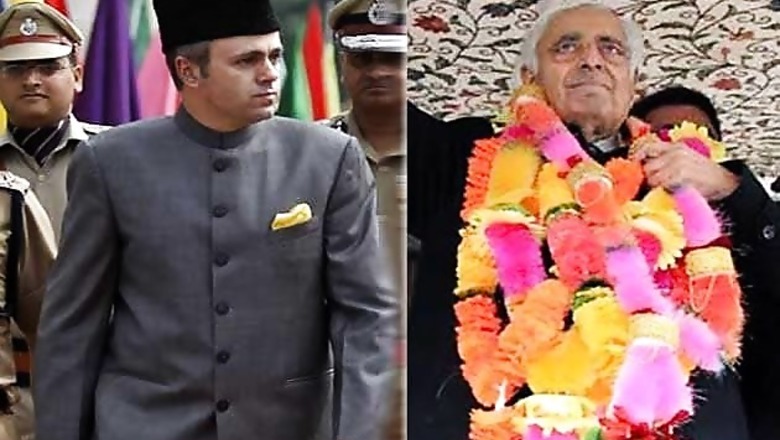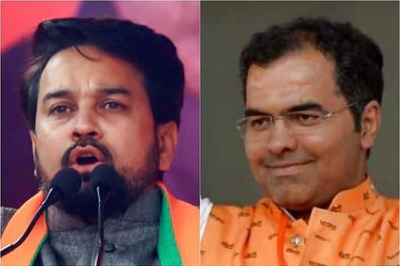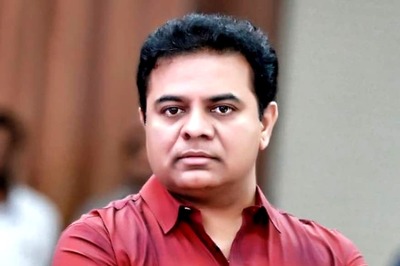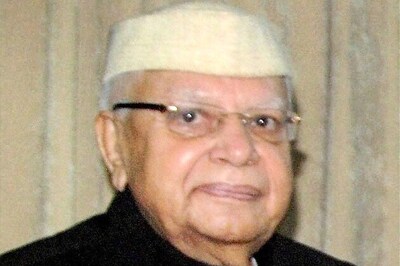
views
New Delhi: Kashmir Valley is in the midst of Chillai-Kalan, a period of 40 days of harshest winter, even as the political temperature is rising in the state with political parties, candidates, voters, the Central government and even the world community waiting for Assembly elections results with bated breath. The results of Jammu and Kashmir Assembly elections will be harsh and cold for a few and at the same time bring happiness in the camp that will form the next government in the state.
The over one-month long election process for the 87-member Jammu and Kashmir Assembly held in five phases in the militancy-hit state was marred by terror strikes resulting in the death of several people including many security personnel but the highlight was a record voter turnout of 65 per cent, which is the highest in the state since the 1987 elections and four per cent more than 2008.
The ruling National Conference is facing a stiff challenge particularly from the Peoples Democratic Party (PDP), BJP) and Congress with some regional political entities and a few independents also having their spheres of influence. The National Conference and Congress had formed a coalition government after the 2008 elections after winning 28 and 17 seats respectively but the two parted ways a few weeks a before Assembly elections making it a four cornered race in the state.
A total of 821 candidates including 276 independents are awaiting their fate which will be known once Electronic Voting Machines are opened at 28 counting centres set up at the district headquarters. As is the practice postal ballots will be counted first followed by EVMs.
Jammu and Kashmir Chief Electoral Officer (CEO) Umang Narula said that Kupwara, Baramulla and Doda have more than one counting centre while the migrant votes of all constituencies would be counted at Jammu, Delhi and Udhampur respectively.
Giving a thumbs down to separatist leaders particularly Syed Ali Shah Geelani of the All India Hurriyat Conference (Hardline faction) who had given an election boycott call, the voters trooped to the polling stations in large numbers braving the bitter cold and threat of terror strikes.
While the high turnout is a good sign, the indications are that Jammu and Kashmir electorate has also voted for "badlav" (change), a term much in currency in the state which unlike other states of India elects a new Assembly after every six years. All the four major parties National Conference, PDP, BJP and Congress claim that the high voter turnout will work in their favour.
National Conference stares at rout:
Chief Minister Omar Abdullah is facing massive anti-incumbency and he left the family bastion of Ganderbal to contest from two seats - Beerwah in Budgam district and Sonawar in Srinagar. But the National Conference is unlikely to reap any benefit from such a move as Omar's move to leave Ganderbal is seen throwing in the towel. While the situation is grim for the National Conference all over the state, nowhere it is as precarious as in Srinagar where the party holds all eight seats but is fighting hard to retain them.
In fact the fight is so tough for the National Conference that its veteran leader and Rural Development Minister Ali Mohammad Sagar, who is seeking re-election for the sixth time from Khanyar constituency, is finding the challenge of former trade union leader and PDP candidate Khursheed Alam extremely difficult to tackle.
Omar started his innings with a lot of hope but the young and dynamic leader of 2008 proved to be a big failure in turning around the state even though terror activities were down from the highs of 1990s. Almost his entire tenure saw Jammu and Kashmir lurch from one challenge, controversy and problem to other with the state government failing to tackle them properly. Two of the biggest challenges - the stone throwing incident of 2010 and the massive floods in Kashmir Valley in 2014 - have shown Omar administration in very bad light.
Sensing a rout, Omar has already started to warm up to the BJP tweeting in favour of the Bharat Ratna for former prime minister Atal Bihari Vajpayee and also claiming that no single party would be able to form the government on its own. Even though Omar has denied that he would join hands with the BJP, yet it may not come as a surprise if the two come together.
PDP in the driver's seat:
Former chief minister Mufti Mohammad Sayeed's PDP is likely to be the biggest beneficiary, particularly in Kashmir Valley which is the state's largest region with 46 seats while Jammu has 37 constituencies and Ladakh just four.
Sayeed, aiming to retain Anantnag and hoping to be the next chief minister, had launched a no holds barred campaign against the National Conference government. Leveraging his clean and pro-people image, Sayeed has helped his party spread across the entire Kashmir valley and in several parts on Jammu. Traditionally PDP has been strong only in south and some pockets of north Kashmir.
Almost the last six years have seen Jammu and Kashmir lurch from one challenge, controversy and problem to other, the two biggest in incidents - the stone pelting of 2010 and the massive floods in Kashmir Valley in 2014 - have been used by the PDP to push the National Conference into a corner.
He is riding high not only because of anti-incumbency against the National Conference government but also has a lot of goodwill as people recall his tenure with fondness. They credit Sayeed for taking several steps to make the live of a common Kashmiri, who has been sandwiched between security forces on one side and terror groups on the other, much easier.
He was in power from November 2002 to November 2005. His government disbanded the elite anti-terror Special Operations Group (SOG) of Jammu and Kashmir Police which faced several accusations of human rights violations and was feared across the state as being extremely ruthless during crackdowns and interrogations.
BJP gains but still has a long way to go:
Using the biggest gun in its arsenal - Prime Minister Narendra Modi - extensively to fulfil its ambition of "Mission 44+" which if succeeds will mean that the party can form the government on its own, the BJP also joined hands with former separatist leader Sajjad Gani Lone's Jammu and Kashmir People's Conference. Lone's political future, too, is hanging by a thread and he will remain relevant in the state only if he manages to win from Handwara, an area where terror groups are still very active, where his opponent is Consumer Affairs and Public Distribution (CAPD) Minister Choudhary Mohammad Ramzan and Ghulam Mohiuddin Sofi of the PDP.
BJP's best chance at forming the government is only if the party sweeps the Jammu region and its alliance partner Lone manages to win a few seats in Kashmir, which is going to be an uphill task considering the opposition in the valley. BJP had hoped that Gellani's boycott call would be a success in Kashmir which coupled with a high turnout of the migrant Pandit voters would ensure a few seats for the party. But the script turned on its head with the Kashmiri voters coming out in large numbers on the voting day even though some of the seats did see an impact of the boycott call.
Jammu is also important for Congress as some of its tallest state leaders hail from the region including Deputy Chief Minister and Education Minister Tara Chand and Sham Lal Sharma. The party must only retain the five seats it won in 2008, but also substantially improve its tally to remain a force in the state. But given the current anti-Congress sentiments in the state, such a scenario is highly improbable even if not outright impossible.
One leader who may play an important role in the formation of the next government is Communist Party of India-Marxist Jammu and Kashmir General Secretary Mohammad Yousuf Tarigami, who is seeking re-election for the fourth time from Kulgam. Tarigami enjoys a good reputation and in the event of a hung Assembly, he can rally around independents and smaller parties on one platform. He has also made it clear that he will only support a Kashmir-centric party.
Braving biting cold, boycott calls, terror attacks and the mayhem caused by recent floods, the Jammu and Kashmir voter has given his verdict. Elections in the state are always a tense affair as the border state not only faces armed insurgency actively supported by Pakistan, but also because of the feeling of alienation especially in Kashmir about what its residents call the highhandedness of India and its security agencies.
The state has spent almost three decades caught in the crossfire between security forces and terror groups. Many generations have known and seen nothing but violence, torture and killings. Even though terror strikes have come down in the last few years, yet the state is still simmering.
While elections have taken place regularly since 1996, separatists led by the Hurriyat Conference, terror groups and Pakistan have always questioned the same accusing India of holding it using guns, especially in Kashmir.
But its residents are also impatient now and want to catch up with rest of India. In the elections Issues like employment, development, corruption and leadership have been at the centre stage. While anti-India sentiments still rule the roost in many areas, support for armed insurgency has come down which is a very welcome sign.
After the next government formed, its biggest challenge will be to keep the guns silent, ensure rapid development and end the alienation of the people, especially in the Kashmir valley.


















Comments
0 comment